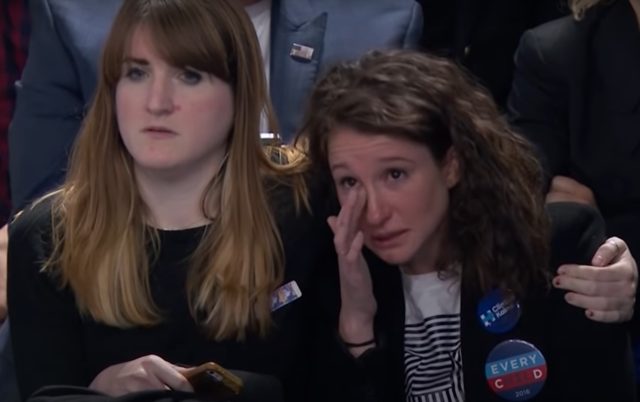Evie magazine unpacked analysis of a Pew Research Center survey published last year, and subsequently arrived at the compelling possibility that science is telling us left-wing ideology and mental illness are correlated.
Andrew Stiles at the Washington Free Beacon drew attention Monday to the Evie magazine piece, published last week, showing the March 2020 Pew Research data revealed white liberals are more likely than other ideological/racial groups to have been diagnosed with a mental health disorder.
With a focus on younger women’s health and relationship issues, Evie’s Elizabeth Condra noted that over 50 percent of white, liberal women under 30 have been diagnosed with a mental health condition at some point.
“Are we worried yet?” she asked, weighing that while conservatives may label left-wingers as “snowflakes” or having been afflicted with “Trump derangement syndrome,” and the left identifies those on the right as “racists, bigots, misogynists, etc.,” the Pew Research data is something to consider seriously.
Condra explained:
[W]hat if what was once a cheap shot or a personal insult has actually been found to bear scientific correlation between the individuals who hold progressive ideologies and an increased risk of mental illness? That’s exactly what Pew Research has found — and all politics aside, the shocking diagnosis of over 50% of liberal women with some form of mental health medical diagnosis is a public health concern that no one seems to be discussing, let alone taking seriously.
In a thread in April 2020, doctoral candidate Zach Goldberg analyzed the Pew Research data that focused at the time on the effects of the coronavirus pandemic as it had just become a harsh reality in America.
The entire survey of 11,537 U.S. adults was conducted March 19-24, 2020, using the Pew Research Center’s American Trends Panel. Wave 64 of the study dealt with mental health issues.
Goldberg first observed the Pew data showed “white (and especially ‘very’) liberals are far more likely than all other ideological-racial subgroups to report being diagnosed with a mental health condition.”
1/n Two interesting findings thus far from my analysis of Pew's March 2020 COVID-19 survey. First, white (and especially 'very') liberals are far more likely than all other ideological-racial subgroups to report being diagnosed with a mental health condition. pic.twitter.com/RynS9lk0jR
— Zach Goldberg (@ZachG932) April 11, 2020
He continued:
Overall, and with one exception (white moderates), those in 18-29 age group are more likely to report being diagnosed with a mental health condition. The differences among white liberals, though, are striking: almost half of white liberals in this cohort report a diagnosis.
11/n Overall, and with one exception (white moderates), those in 18-29 age group are more likely to report being diagnosed with a mental health condition. The differences among white liberals, though, are striking: almost half of white liberals in this cohort report a diagnosis. pic.twitter.com/eKFG1GZF8t
— Zach Goldberg (@ZachG932) April 11, 2020
When sex and age were factors, 56.3 percent of white women between the ages of 18 and 29 and who labeled themselves as “liberal,” said they had been given a mental health diagnosis, compared to 27.3 percent of conservatives in the same categories and 28.4 percent of moderates:
16/n Some of you asked for it, so here is the last chart broken down by gender. Biggest gap within age x ideological groups is between white liberal men (33.6%) and women (56.3%) in the 18-29 category pic.twitter.com/brIKO11KSx
— Zach Goldberg (@ZachG932) April 13, 2020
After considering some of the coronavirus factors as well, Goldberg noted that “at least some of the differences in the covid-mental health battery between white liberals and others are accounted for by the former’s higher likelihood of being diagnosed with a mental health condition”:
7/n In other words, at least some of the differences in the covid-mental health battery between white liberals and others are accounted for by the former's higher likelihood of being diagnosed with a mental health condition.
— Zach Goldberg (@ZachG932) April 11, 2020
“It’s possible that the disparities in self-reported diagnosis are simply or partly a function of white liberals being more likely to seek mental health evaluations,” he surmised. “I don’t have the data to answer this question. But given that they also tend to score higher on neuroticism (and, not to mention, score lower on life satisfaction/happiness), I think at least some of this difference is genuine”:
8/n It's possible that the disparities in self-reported diagnosis are simply or partly a function of white liberals being more likely to seek mental health evaluations. I don't have the data to answer this question. But given that they also tend to score higher on neuroticism..
— Zach Goldberg (@ZachG932) April 11, 2020
Finally, Goldberg noted his motivation for his analysis as well:
I didn’t write this thread to mock white liberals or their apparently disproportionate rates of mental illness (and you shouldn’t either). Rather, this is a question that’s underexplored and which may shed light on attitudinal differences towards various social policies.
Goldberg more recently observed other data that show white liberal support for increasing immigration levels is up to about 62.5 percent, an increase from nearly 36 percent in 2016:
1/n White liberal support for increasing immigration levels is up to ~62.5% in the latest ANES 2020 (up from ~36% in 2016). pic.twitter.com/tu0ZVq2axJ
— Zach Goldberg (@ZachG932) March 29, 2021
Interpreting the data, Condra noted that progressivism appears to demand “unrelenting focus on oppression, verbal violence, and micro-aggressions.”
“We know that building resiliency against hardship is the best weapon against depression and anxiety, yet progressive ideology forces its followers to wallow in feelings of helplessness and victimhood,” she observed. “Instead of empowering women and minorities with self-knowledge, strength of character, and resilience to hardship, progressivism encourages victims to stay in a place of fear and helplessness.”

COMMENTS
Please let us know if you're having issues with commenting.